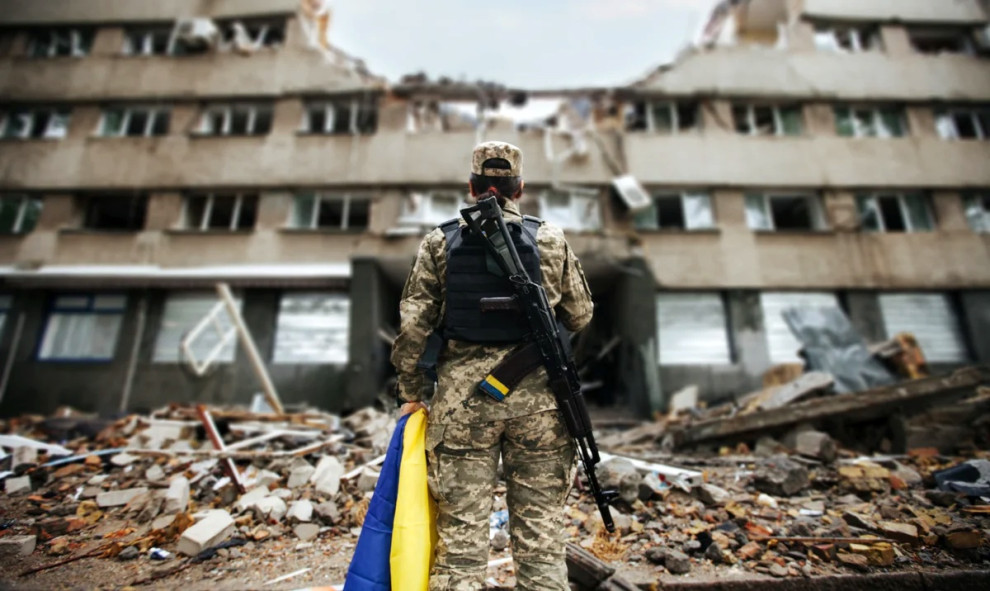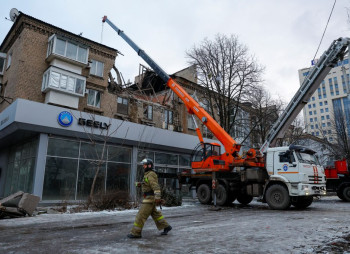One year since the start of Russia’s full-scale invasion, Ukraine’s economy and infrastructure are in tatters, with the government and its allies planning the largest rebuilding effort since World War II.
The World Bank estimates that Ukrainian GDP shrank by 35% in 2022, and projected in October that the population share with income below the national poverty line would rise to almost 60% by the end of last year — up from 18% in 2021.
The World Bank has so far mobilized $13 billion in emergency financing to Ukraine since the war began, including grants, guarantees and linked parallel financing from the U.S., U.K., Europe and Japan.
The International Monetary Fund estimates that the Ukrainian economy contracted by 30%, a less severe decline than previously projected. Inflation has also begun to decelerate, but ended 2022 at 26.6% year-on-year, according to the National Bank of Ukraine.
IMF Managing Director Kristalina Georgieva visited Ukraine and met with President Volodymyr Zelenskyy and NBU Governor Andriy Pyshnyy, among others.
In a statement, Georgieva said she saw “an economy that is functioning, despite the tremendous challenges,” commending the government’s vision to move from recovery to a “transformational period of reconstruction and EU accession.”
“Shops are open, services are being delivered and people are going to work. This is remarkable testament to the spirit of the Ukrainian people,” Georgieva said, also noting that government agencies, economic institutions and the banking system are fully operational.
“Notwithstanding the attacks on critical infrastructure, the economy is adjusting, and a gradual economic recovery is expected over the course of this year,” she added.
Georgieva reiterated the IMF’s commitment to supporting Ukraine, and the Washington-based institution has provided $2.7 billion in emergency loans over the past year. However, it is also working with Ukraine under an economic policy monitoring program, a precursor to establishing a fully-fledged IMF lending program, as Kyiv seeks a $15 billion multi-year support package.
“The international community will continue to have a vital role in supporting Ukraine, including to help address the large financing needs in 2023 and beyond,” Georgieva concluded.
“The war in Ukraine has had far-reaching consequences for the local, regional, and global economy. Only if we work together as a global community will we be able to build a better future.”
Massive Ukraine's infrastructure rebuild
At a G-20 meeting on Thursday, U.S. Treasury Secretary Janet Yellen called on the IMF to “move swiftly” toward the fully financed loan program, with Washington readying economic assistance to the tune of $10 billion in the coming weeks.
The U.S. has provided a cumulative $76.8 billion in bilateral military, economic and humanitarian aid to Ukraine between Jan. 24, 2022, and Jan. 15, 2023, according to Germany’s Kiel Institute for the World Economy.
This includes $46.6 billion in military grants and loans, weapons and security assistance, by far outstripping the rest of the world. The U.K. has been the second-largest military contributor at $5.1 billion, followed by the European Union at $3.3 billion.
As the conflict enters its second year and shows no sign of abating, with Russia increasingly attacking critical infrastructure and power shortages persisting, the Ukrainian economy is expected to contract again this year, albeit at a low single-digit rate.
A recent estimate from the Kyiv School of Economics put the total damage to Ukrainian infrastructure at $138 billion, while Zelenskyy has estimated that rebuilding the country could end up costing more than $1 trillion.
“Since the beginning of Russia’s war against Ukraine, at least 64 large and medium-sized enterprises, 84.3 thousand units of agricultural machinery, 44 social centers, almost 3 thousand shops, 593 pharmacies, almost 195 thousand private cars, 14.4 thousand public transport, 330 hospitals, 595 administrative buildings of state and local administration have been damaged, destroyed or seized,” the KSE report highlighted.
Meanwhile, Ukraine’s budget deficit has risen to a record $38 billion and is expected to remain elevated, though strong external support from Western governments and the IMF is likely, according to Razan Nasser, emerging market sovereign analyst at T. Rowe Price.
“This should help to plug the financing gap, which in turn should help to reduce reliance on monetary financing this year,” Nasser said.
In its January policy meeting, NBU officials discussed a number of measures aimed at avoiding a return to monetary financing of the budget deficit.
External creditors in August agreed to a two-year standstill on sovereign debt, acknowledging the immense pressure being exerted by the war on the country’s public finances.
“This will likely be the first step of the restructuring, with a deep haircut on the debt likely. It is difficult to predict the size of this debt reduction as it depends on the state of the Ukrainian economy at the time the restructuring is agreed,” Nasser said.
He added that a “political decision” will be needed on how much private creditors should contribute to the reconstruction costs in light of the colossal damage inflicted on infrastructure so far.
“When this war does eventually end, the scale of the reconstruction and recovery effort is likely to eclipse anything Europe has seen since World War II,” he said.
This sentiment was echoed on Wednesday by Deputy Prime Minister Yulia Svyrydenko, who told Politico during an interview in Brussels that the reconstruction should start this year, despite there being no immediate end to the conflict in sight.
“It’s going to be the biggest reconstruction since World War II,” she said. “We need to start now.”
Although beginning the rebuild while the war is still ongoing and Russia continues to target civilian infrastructure might seem counterintuitive, Daniela Schwarzer, executive director of Open Society, told CNBC on Thursday that it was essential.
“Ukrainians very clearly make the case that actually, reconstruction has to begin in some parts of the country while the war is still ongoing because for the country, the destruction of infrastructure — which really happens every day — needs to be handled otherwise people can’t live, the economy can’t pick up, and so there’s a huge task,” she said.
“We will see over the next few months how international financial institutions, including the European ones such as the International Bank of Reconstruction and the European Investment Bank along with governments and the EU, plus the United States, but the next important question is how can private investments eventually be brought back to Ukraine because governments alone can’t rebuild the country.”






